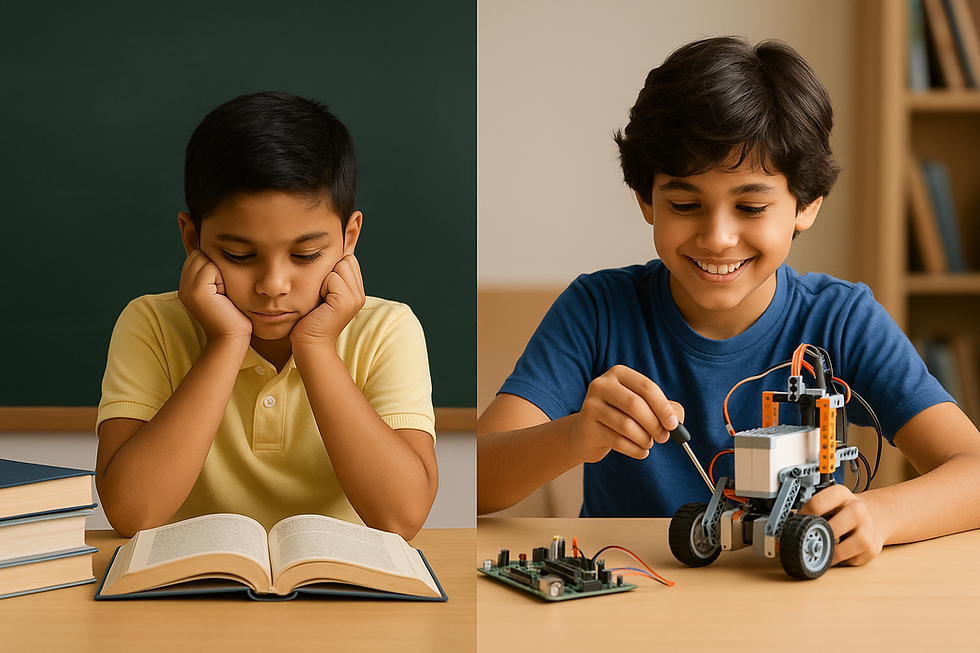Beyond Exams: The Promise & Pitfalls of UP’s Project Praveen Skill Rollout
- Rohit Malekar

- Oct 10
- 3 min read
When “Skill” Becomes the New Buzzword
In a state where board exams dominate every conversation, Uttar Pradesh’s new Project Praveen promises a welcome shift. Starting October 20, government secondary schools will begin skill training alongside academics, from electrical repairs and computer hardware to hospitality, beauty care, and retail basics.
It sounds like progress. But will this actually make our children more employable or simply add one more layer to an already overloaded timetable?
The Problem: Theory Without Tools
Ask any parent of a Class 10 student: how many practical skills has your child really learned in school?
Across India, employers have said it for years: students can recite answers but can’t apply them. The National Education Policy (NEP 2020) urged states to integrate vocational training by Grade 6. Yet, implementation has been patchy. Many schools lack trainers, labs, or even time between unit tests and coaching classes.
Project Praveen wants to change that. The scheme will begin in select districts, aiming to train teachers and create state-certified skill modules under the Uttar Pradesh Skill Development Mission.
What Parents Should Know
Here’s what to watch for once your child’s school announces its rollout:
Skill options: Initial modules reportedly include basic electrical work, computer assembly, and tailoring, with others like drone repair and agri-tech planned later.
Optional or mandatory? For now, most schools will offer skills as elective modules within the timetable, not as exam-weighted subjects.
Certification: Students may earn UPSDM-endorsed certificates, useful for future polytechnic or ITI admissions.
Class-time trade-off: Each skill module takes about 100 hours per term, likely replacing some general periods or co-curricular slots.
So yes, while “hands-on learning” sounds empowering, the real test lies in scheduling and quality, not just policy intent.
The Promise: Learning That Feels Real
Imagine students who can repair an appliance, manage a local shop’s billing software, or set up a simple website, before they graduate.
When done well, skill integration bridges the biggest gap in Indian schooling, the gulf between classroom knowledge and livelihood readiness. Studies by the National Skill Development Corporation show that vocational exposure improves confidence and career clarity even for students who later pursue higher academics.
If Project Praveen gets this right, it could make secondary schooling far more relevant, especially for rural and semi-urban youth who enter the workforce early.
The Pitfalls: Overload Without Guidance
But here’s the caution parents must note.
When new programs arrive without adequate counselling, students already under exam stress feel torn, another subject, another assessment. Teachers, too, face dual expectations: finish the board syllabus and teach new modules.
We’ve seen this before. In several states, skill subjects launched with fanfare ended up being ticked off on paper because schools lacked trained instructors. Certificates were issued, but real skills weren’t.
Without guidance and flexible scheduling, “skill development” risks turning into symbolic compliance, yet another checkbox between exams.
What You Can Do as a Parent
SchoolDoor’s advice is simple: stay proactive and informed.
✅ Request your school’s draft schedule — how are skill sessions being slotted? Which subjects lose time?
✅ Ask about trainer credentials — are these teachers newly trained or externally deputed?
✅ Push for counselling — every child should know why they’re learning a skill and how it fits future options.
✅ Advocate for flexibility — let students pick combinations that match interest, not the convenience of staffing.
Our Take: Integration, Not Addition
At SchoolDoor, we welcome the intent behind Project Praveen. Skill education deserves space in every child’s timetable. But true integration means rethinking what “learning hours” mean, not just stretching the same day thinner.
Skill training shouldn’t compete with core academics; it should complement them. Let children learn to wire a circuit and write an essay about energy efficiency. That’s when theory meets practice and education begins to feel real again.



Comments